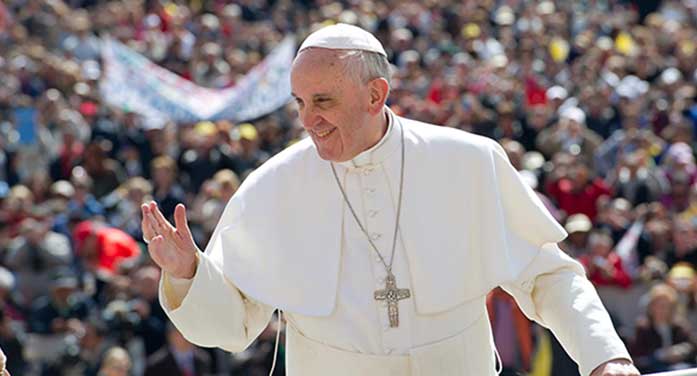Francis’s passing opens the door to a new leader, but key teachings on abortion, women priests and morality are unlikely to change
Pope Francis passed away on April 21 at the age of 88. While it was sad to hear this news, the Vatican’s announcement had been expected for some time.
The Holy Father had been in ill health for several months. The situation looked pretty dire in February when he required oxygen and several blood transfusions after experiencing an asthmatic respiratory crisis. The Vatican acknowledged he was suffering from other conditions, including a bronchial spasm, lung infection, pneumonia and early-stage kidney failure.
Many Catholics and non-Catholics braced themselves for the worst.
Yet, the Pontiff seemingly turned the corner the following month. He was taken off mechanical ventilation on March 3 and discharged from Rome’s Gemelli University Hospital on March 23. It was announced by the Vatican that he would spend two months of recuperation at Domus Sanctae Marthae in Vatican City. While his condition was far from ideal—Raymond Arroyo depicted him as looking “visibly impaired” in a March 23 video clip posted on X, which seemed valid—it was still a marked improvement.
Pope Francis also maintained a limited work schedule. King Charles and Queen Camilla met with him on April 9. U.S. Vice-President JD Vance had a brief audience with him on Easter Sunday, the day before the Pope’s death. Francis was even strong enough to make a few public appearances during Easter, including a ride in the Popemobile and making the important Urbi et Orbi blessing—given by the Pope from the central balcony of St. Peter’s Basilica.
Alas, the audience who saw him in St. Peter’s Square that day was also privy to his final public appearance. “The cause of Pope Francis’ death has been identified as a stroke,” the Vatican News reported on April 21, “followed by a coma and irreversible cardiocirculatory collapse.” Requiescat in pace, Holy Father.
What happens next?
A papal conclave is being arranged to choose Francis’s successor. “The word conclave is derived from the Latin meaning ‘with key,’ indicating its strict secrecy,” USA Today’s Christopher Cann wrote on April 21. As he put it, “the most senior figures of the Catholic Church in the coming days will arrive in Italy and lock themselves in the Vatican for the papal conclave—the highly secretive process by which the next representative of God on Earth is chosen.”
While Cann’s description has a bit of flair for the dramatic, that’s basically what happens. It will likely take a few days for the Cardinals to make a decision, or maybe a week or two. Then again, a few conclaves have lasted for years. It actually took from 1268 to 1271 for cardinals to choose Pope Gregory X as a compromise candidate.
Let’s also consider the observations of John L. Allen, Jr., a longtime senior correspondent for National Catholic Register, who wrote an insightful book about this ancient process, Conclave: The Politics, Personalities and Process of the Next Papal Election.
Allen wrote in a March 1, 2013 column that “a conclave is not the Iowa caucuses. Either John Paul II or Benedict XVI appointed each of the 117 cardinals who will cast a ballot, including 11 Americans, so there will be little ideological clash. No matter what happens, the church almost certainly won’t reverse its bans on abortion, gay marriage or women priests.” Moreover, Allen wrote that “papal transitions are more about changes in tone than substance.”
This is what we should expect to happen when a new Pope is chosen.
Pope Francis, as I and others have written, was a left-leaning, politically charged Pope. He was taught by the Jesuits, who have historically supported left-wing theories like social justice and taken oaths of poverty, chastity and obedience. He was troubled by the excesses of laissez-faire capitalism and the free market economy, depicting them as part of a “dogma of neoliberal faith.” He also wrote an encyclical that opposed “global environmental deterioration” and described the climate as a “common good” in our society.
In spite of this, Pope Francis was a traditionalist and social conservative. Similar to most of his predecessors, he was staunchly opposed to abortion and euthanasia, rejected capital punishment, supported the concept of chastity and never approved any female Cardinals.
There’s no reason to believe the next Pope will be significantly different.
As Allen pointed out, the Pontiff’s tone will obviously change but the substance will remain largely the same. Whether the conclave selects another moderate (Italy’s Pietro Parolin), or picks a conservative (Hungary’s Péter Erdő), or backs the first Black Pope in centuries (Ghana’s Peter Turkson), or takes a giant leap and supports the first-ever Asian Pope (the Philippines’s Luis Antonio Tagle), the ideas and principles of the Roman Catholic Church will remain intact for the foreseeable future.
This additional bit of news, much like Francis’s unfortunate passing, was also to be expected.
Michael Taube is a political commentator, Troy Media syndicated columnist and former speechwriter for Prime Minister Stephen Harper. He holds a master’s degree in comparative politics from the London School of Economics, lending academic rigour to his political insights.
Explore more on Catholic church
The views, opinions, and positions expressed by our columnists and contributors are solely their own and do not necessarily reflect those of our publication.
Troy Media empowers Canadian community news outlets by providing independent, insightful analysis and commentary. Our mission is to support local media in helping Canadians stay informed and engaged by delivering reliable content that strengthens community connections and deepens understanding across the country.




